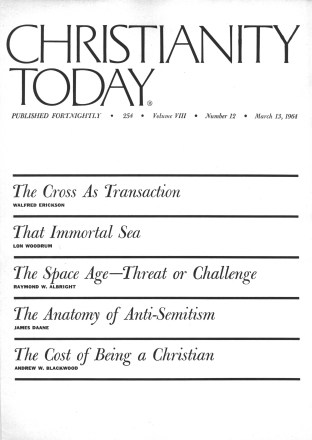The “antithesis” has been a subject of debate among Christians since the beginnings of the Church. While all sought to bow before the imperial demands of Jesus Christ, not all have agreed on the meaning and implications of the “antithesis.” Christians have accused Christians on this point. Some have rebuked others for not taking the antithesis with full earnestness, for watering down the clear distinction made by the Bible: “What fellowship has light with darkness, or what does the believer have in common with the unbeliever?” Others have been fearful lest some of their brethren be too simplistic, absolutistic, and thus irresponsible in their relations with the non-confessing world. While all sought to reckon with the antithesis, some thought the others were relativistic and others thought some were absolutistic.
The question has usually not been whether there is an antithesis. The problem is rather to discover where the line is drawn and what the practical implications for it are. There is always the possibility of our constructing an antithesis along lines drawn where we want them to be, according to our judgments and prejudices. This is the possibility of Pharisaism. Pharisees are always very antithesis-conscious; but they draw the line of separation across an area not recognized by God.
In Jeremiah’s day there was an antithesis accepted by many Israelites. It was expressed in the slogan: “The Temple of the Lord,” suggesting that the antithesis divided those guaranteed God’s blessing by the possession of the temple from those who had no temple and hence no divine favor. Their concept of antithesis was the product of self-delusion and pretension. Assuming themselves to be on God’s side of the antithesis, they brought God’s judgment upon themselves because of their pride.
In Jesus’ day, the Pharisees made a division between the law-keepers and the publicans, or the law-keepers and those who did not know the law. The concept of antithesis was a pretense used by the Pharisees for their own self-justification. It becomes clear that the recognition of an antithesis is not a guarantee of being on the Lord’s side. The Pharisees knew nothing of grace, and by their obsession with the law they removed the key to knowledge (Luke 11:52). And when Jesus accused them, they assumed that Jesus fell on the wrong side of the antithesis; therefore they judged Him. This happens when one allows the bare notion of an antithesis between God and the world to obscure the truth of the Gospel of grace.
The antithesis implicit in the Gospel (“he who is not with me is against me”) does not carry with it a demand for isolation from others. Paul remarks that had this been the case, we would have had to be removed from the world (1 Cor. 5:10). The biblical antithesis has nothing, absolutely nothing to do with human pride. It has much to do with Christians’ shining as lights in the world (Phil. 2:15), with their fulfilling the new commandment of love, with their being lights so that people will glorify God (Matt. 5:16). The antithesis is always an implicit command and responsibility; it is never the description of a status quo that provides an excuse for the pride of fools.
To talk about the antithesis implies an enormous responsibility. For the antithesis has to do with the preaching of the Gospel. This is why Paul was so profoundly moved by the thought. He knew that Christ evoked an “anti” sentiment, that the Cross had its enemies. But he says this with tears. And this is not a cheap sentimentality; it is profound Christian passion. He knew that enmity against the Lord of Glory is pure folly and groundless hatred. He knew that Christ was hated without reason. Paul had an eye for this hostility, and it made him weep as a child weeps. And then, then his life was filled with the dynamic of the passionate apostolate, zeal for this Lord who is hated without cause. Only he who has a share in the experience of Paul is able honestly and responsibly to talk about the antithesis.
Without this passion, the person who talks much about the antithesis is likely only to be building a spiritual pedestal for himself. The person of the antithesis is, first of all, a person for something, namely the Lord. In the depths of his salvation the antithesis becomes meaningful. In the spirit of him who came, not to judge the world but that the world through him might be saved, the antithesis becomes a motive for love and action. In this atmosphere, Pharisaism is out of place, and false antitheses are exposed.
A warning against a cheap antithesis may not be unneeded. False antitheses obscure the Gospel that must be preached to all creatures. If we have a good eye for the real contradictions that run through the world, we go into action. If we pose our own antitheses, we are inclined to sit back and enjoy our favored status. Informed by the biblical antithesis, we are forced to recall that the sun of God’s grace had to dispel the darkness that shrouded our own lives. We remember that only one slogan is really meaningful: “Go then, lights in the world, witnesses of the Lord, in word and deed, and bring the Good News to those who are without a Shepherd.” And go remembering that the Lord who sends you was moved to compassion when he saw the shepherdless souls.










